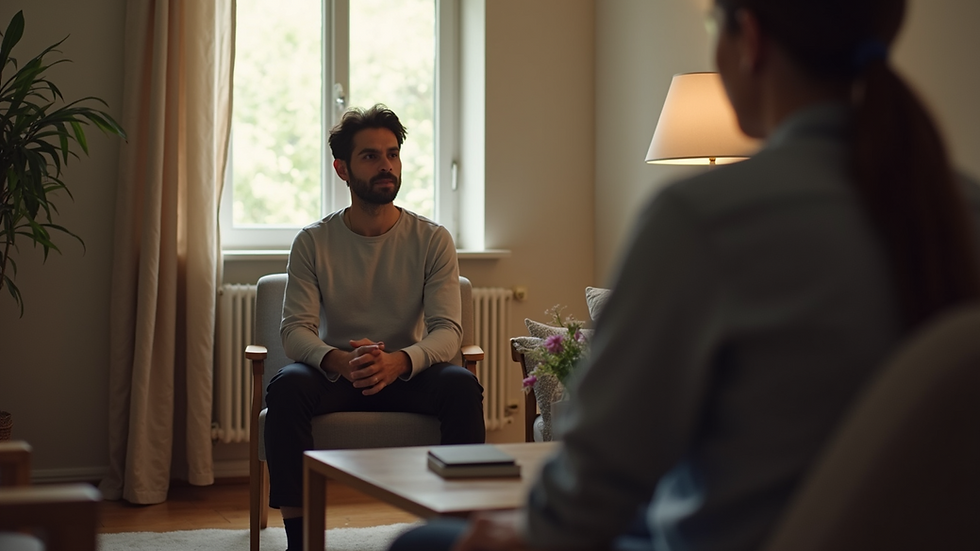Navigating Long Covid: Therapy for Recovery
- riseabovecounselin1
- Aug 17
- 3 min read
Updated: Sep 5
Long Covid is a term that has emerged as we continue to understand the long-term effects of COVID-19. For many, the journey to recovery is not straightforward. Symptoms can linger for weeks or even months after the initial infection. This can lead to feelings of frustration, confusion, and isolation. Therapy can play a vital role in helping individuals navigate these challenges.
In this post, we will explore how therapy can support recovery from Long Covid. We will discuss the symptoms, the emotional impact, and practical strategies for coping.
Understanding Long Covid
Long Covid refers to a range of symptoms that persist after the acute phase of COVID-19. These symptoms can vary widely among individuals. Some common ones include:
Fatigue
Shortness of breath
Brain fog
Joint pain
Sleep disturbances
These symptoms can significantly impact daily life. Many people find it hard to return to their normal routines.
The uncertainty surrounding Long Covid can also lead to anxiety and depression. Understanding that these feelings are valid is the first step toward recovery.
The Emotional Toll of Long Covid
Living with Long Covid can be emotionally draining. Individuals may experience:
Frustration: Many feel frustrated by their inability to return to normal activities.
Isolation: The ongoing symptoms can lead to social withdrawal.
Fear: There may be fear about the future and concerns about health.
Therapy can help address these emotional challenges. A trained therapist can provide a safe space to express feelings and explore coping strategies.
The Role of Therapy in Recovery
Therapy offers several benefits for those dealing with Long Covid. Here are some key ways it can help:
1. Providing Support
Therapists can offer emotional support. They can help individuals process their feelings and experiences. This support can be crucial in reducing feelings of isolation.
2. Teaching Coping Strategies
Therapists can teach practical coping strategies. These may include:
Mindfulness techniques
Breathing exercises
Journaling
These strategies can help manage anxiety and improve overall well-being.
3. Setting Realistic Goals
Therapy can assist in setting realistic recovery goals. This can help individuals focus on small, achievable steps. Celebrating these small victories can boost motivation and morale.
4. Encouraging Self-Compassion
Therapists can help individuals practice self-compassion. It is important to recognize that recovery takes time. Being kind to oneself can ease the pressure to "get back to normal" quickly.
Practical Strategies for Coping
In addition to therapy, there are practical strategies that can aid recovery from Long Covid. Here are some suggestions:
1. Establish a Routine
Creating a daily routine can provide structure. This can help individuals feel more in control.
2. Prioritize Rest
Rest is essential for recovery. Listening to the body and taking breaks when needed is important.
3. Stay Connected
Maintaining social connections can combat feelings of isolation. Even a simple phone call or video chat can make a difference.
4. Engage in Gentle Exercise
If possible, gentle exercise can help improve physical and mental health. Activities like walking or stretching can be beneficial.
5. Focus on Nutrition
Eating a balanced diet can support overall health. Nutrient-rich foods can help the body heal.
Seeking Professional Help
If you or someone you know is struggling with Long Covid, seeking professional help is important. A therapist can provide tailored support.
When looking for a therapist, consider the following:
Experience: Look for someone with experience in dealing with chronic illness or trauma.
Approach: Different Therapists use different approaches. Find one that resonates with you.
Comfort: It is essential to feel comfortable with your therapist. Trust your instincts when choosing someone to work with.
The Importance of Community
Community support can also play a vital role in recovery. Connecting with others who understand the experience can be comforting.
Consider joining support groups, either in-person or online. These groups can provide a sense of belonging and shared understanding.
Moving Forward with Hope
While the journey through Long Covid can be challenging, it is important to hold onto hope. Recovery is possible, and many individuals find ways to adapt and thrive.
Therapy can be a powerful tool in this journey. It can provide the support and strategies needed to navigate the ups and downs of recovery.

As we continue to learn more about Long Covid, it is essential to prioritize mental health. Taking care of emotional well-being is just as important as addressing physical symptoms.
Final Thoughts
Navigating Long Covid is not easy, but you are not alone. Therapy can provide valuable support and guidance.
Remember to be patient with yourself. Recovery takes time, and it is okay to seek help along the way. Embrace the journey, and take it one step at a time.
With the right support and strategies, a brighter future is possible.




Comments